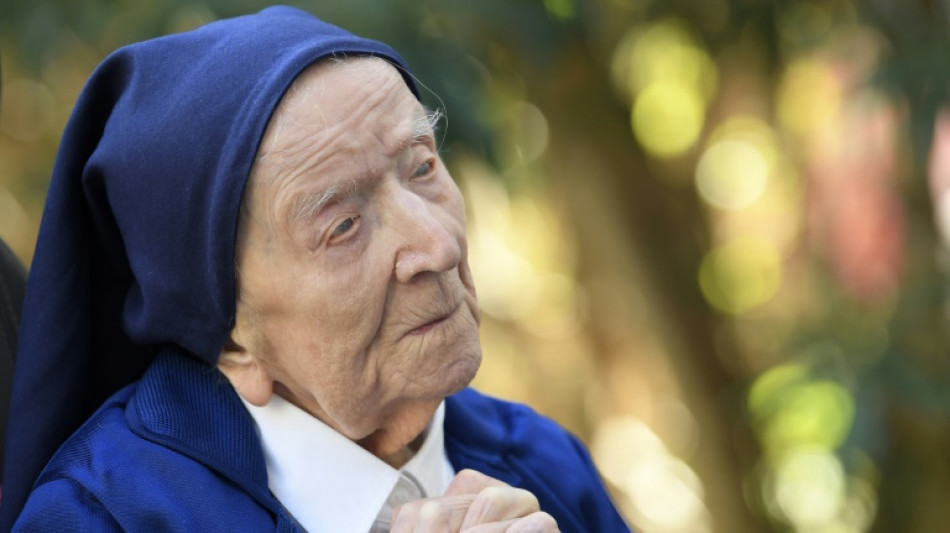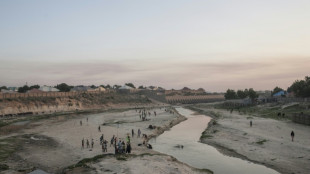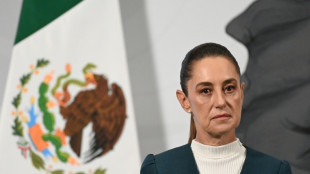
-
 Scandic Trust Group strengthens sales network with First Idea Consultant
Scandic Trust Group strengthens sales network with First Idea Consultant
-
Germany recall Sane, hand El Mala debut for World Cup qualifers

-
 India thump Australia to take 2-1 lead in T20 series
India thump Australia to take 2-1 lead in T20 series
-
Cameroon's Biya, world's oldest president, sworn in for 8th term

-
 Flick holding firm on Barca high line despite defensive woes
Flick holding firm on Barca high line despite defensive woes
-
Battered US businesses eye improved China trade at Shanghai expo

-
 France opt for Le Garrec as Dupont replacement for 'best team ever' South Africa
France opt for Le Garrec as Dupont replacement for 'best team ever' South Africa
-
Drugmaker AstraZeneca profit jumps as US business grows

-
 'Vibe coding' named word of the year by Collins dictionary
'Vibe coding' named word of the year by Collins dictionary
-
Vietnam evacuates thousands from coast ahead of Typhoon Kalmaegi

-
 European stocks fall after gains in Asia, US
European stocks fall after gains in Asia, US
-
MotoGP legend Agostini admires Marc Marquez's 'desire to win'

-
 Nepal searches for avalanche victims
Nepal searches for avalanche victims
-
Hezbollah rejects any negotiations between Lebanon and Israel

-
 Chapman blitz leads Black Caps to tight T20 victory over West Indies
Chapman blitz leads Black Caps to tight T20 victory over West Indies
-
France urges EU to sanction Shein platform

-
 France opt for Le Garrec as Dupont replacement for South Africa Test
France opt for Le Garrec as Dupont replacement for South Africa Test
-
Turmoil in tiaras at Miss Universe pageant in Thailand

-
 Probe into Thales defence group looking at Indonesian contract
Probe into Thales defence group looking at Indonesian contract
-
US to cancel flights as longest govt shutdown drags on

-
 Home in Nigeria, ex-refugees find themselves in a war zone
Home in Nigeria, ex-refugees find themselves in a war zone
-
Doncic's Lakers hold off Wembanyama's Spurs, Blazers silence Thunder

-
 For Turkey's LGBTQ community, draft law sparks existential alarm
For Turkey's LGBTQ community, draft law sparks existential alarm
-
Musk's $1 trillion pay package to face Tesla shareholder vote

-
 Tonga rugby league star out of intensive care after seizure
Tonga rugby league star out of intensive care after seizure
-
Argentine ex-president Kirchner goes on trial in new corruption case

-
 Dams, housing, pensions: Franco disinformation flourishes online
Dams, housing, pensions: Franco disinformation flourishes online
-
Endo returns as Japan look to build on Brazil win

-
 Franco captivates young Spaniards 50 years after death
Franco captivates young Spaniards 50 years after death
-
German steel industry girds for uncertain future

-
 IPL champions Bengaluru could be sold for 'as much as $2 billion'
IPL champions Bengaluru could be sold for 'as much as $2 billion'
-
Budget impasse threatens Belgium's ruling coalition

-
 New Zealand ex-top cop admits to having material showing child abuse, bestiality
New Zealand ex-top cop admits to having material showing child abuse, bestiality
-
BoE set for finely balanced pre-budget rate call

-
 Australian kingpin obtains shorter sentence over drug charge
Australian kingpin obtains shorter sentence over drug charge
-
Weatherald's unenviable Ashes task: fill giant hole at top left by Warner

-
 Ovechkin first to score 900 NHL goals as Capitals beat Blues
Ovechkin first to score 900 NHL goals as Capitals beat Blues
-
On Mexico City's streets, vendors fight to make it to World Cup

-
 Asian markets bounce from selloff as US jobs beat forecasts
Asian markets bounce from selloff as US jobs beat forecasts
-
Philippine death toll tops 140 as typhoon heads towards Vietnam

-
 Kyrgios targets 'miracle' Australian Open return after knee improves
Kyrgios targets 'miracle' Australian Open return after knee improves
-
'AI president': Trump deepfakes glorify himself, trash rivals

-
 Belgium probes drone sightings after flights halted overnight
Belgium probes drone sightings after flights halted overnight
-
Five things to know about 'forest COP' host city Belem

-
 World leaders to rally climate fight ahead of Amazon summit
World leaders to rally climate fight ahead of Amazon summit
-
Engine fell off US cargo plane before deadly crash: officials

-
 Mexican leader calls for tougher sexual harassment laws after attack
Mexican leader calls for tougher sexual harassment laws after attack
-
Meghan Markle set for big screen return: reports

-
 Japan deploys troops after wave of deadly bear attacks
Japan deploys troops after wave of deadly bear attacks
-
FIFA announce new peace prize to be awarded at World Cup draw in Washington


How long can a healthy human live?
The death of the world's oldest person at the age of 118 has reignited a debate that has divided scientists for centuries: is there a limit on how long a healthy human can live?
After French nun Lucile Randon died last week, Spanish great-grandmother Maria Branyas Morera, 115, has assumed the title of the oldest living person, according to Guinness World Records.
Back in the 18th century, French naturalist Georges-Louis Leclerc, known as the Comte de Buffon, theorised that a person who had not suffered an accident or illness could live for a theoretical maximum of 100 years.
Since then, medical advancements and improving living conditions have pushed the limit back by a couple of decades.
A new milestone was reached when Frenchwoman Jeanne Calment celebrated her 120th birthday in 1995.
Calment died two years later at the age of 122. She remains the oldest person ever to have lived -- that has been verified, at least.
According to the United Nations, there were an estimated 593,000 people aged 100 years or older in 2021, up from 353,000 a decade earlier.
The number of centenarians is expected to more than double over the next decade, according to the Statista data agency.
The Comte de Buffon might also have been surprised by the rise of supercentenarians -- people aged 110 or over -- whose numbers have been increasing since the 1980s.
- Natural limit at 115? -
So how far could we go? Scientists disagree, with some maintaining that the lifespan of our species is limited by strict biological constraints.
In 2016, geneticists writing in the journal Nature said there had been no improvement in human longevity since the late 1990s.
Analysing global demographic data, they found that the maximum human lifespan had declined since Calment's death -- even though there were more elderly people in the world.
"They concluded that human lifespan has a natural limit and that longevity is limited to around 115 years," French demographer Jean-Marie Robine told AFP.
"But this hypothesis is partly disputed by many demographers," said Robine, a specialist in centenarians at the INSERM medical research institute.
Research in 2018 found that while the rate of death increases with age, it slows down after 85.
Around the age of 107, the rate of death peaks at 50-60 percent every year, the research said.
"Under this theory, if there are 12 people aged 110, six will survive to be 111, three to be 112, and so on," Robine said.
- A numbers game -
But the more supercentenarians, the higher chance a few have to live to make it to record ages.
If there are 100 supercentenarians, "50 will live to be 111 years old, 25 to 112," Robine said.
"Thanks to a 'volume effect', there are no longer fixed limits to longevity."
However Robine and his team are publishing research this year which will show that the rate of death continues to increase beyond the age of 105, further narrowing the window.
Does this mean there is a hard ceiling on how long we can live? Robine will not go that far.
"We will continue to make discoveries, as we always have, and little by little the health of the oldest people will improve," he said.
Other experts are also cautious about choosing a side.
"There is no definitive answer for the moment," said France Mesle, a demographer at the French institute of demographic studies (INED).
"Even if they are increasing, the number of people reaching very old age is still quite small and we still cannot make any significant statistical estimate," she told AFP.
So it might be a matter of waiting for rising numbers of supercentenarians to test the "volume effect".
And of course some future medical breakthroughs could soon upend everything we know about death.
Eric Boulanger, a French doctor specialising in the elderly, said that "genetic manipulation" could allow some people to live for 140 or even 150 years.
P.Tamimi--SF-PST




